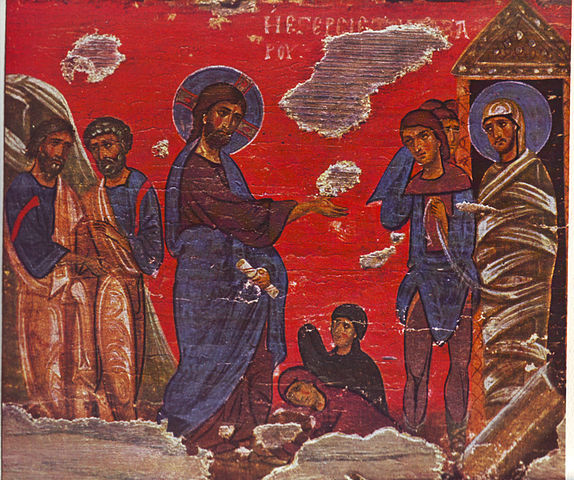“Lazarus, come out!”
In our readings today, it’s all about otherness and authenticity. It should not surprise anyone that any of us with any affiliation to God’s Rainbow Tribe see the Lazarus story as a parallel to the process of coming out and feeling alive once out. Yet our other readings today also speak to the gift of otherness, and the power that emerges from it when we all live into our authentic selves–and our own otherness, in whatever form it takes–as followers of Christ. All of us, in our spiritual pilgrimages, are continually being called by Christ to come out of our false selves, no matter what form they take.
Lazarus is about as “other” as you can get–he’s in the world of the dead before Jesus calls him out of his tomb. Our reading from Joshua illustrates another kind of “other”–Rahab, who is both a prostitute and a Caananite. Yet she recognizes the two spies as representatives of the real deal–emissaries of a God who is capable of miraculous things when one dares to be in relationship with that God.
When Rahab agrees to help the two spies, she shifts the definition of “who, really is an Israelite?” at a time the Israelites are struggling with issues of cultural identity and cultural purity. Is she still one of “them” when she comes to the aid of “us?” (It reminds me of my personal dilemma about “What constitutes an American car?” Is a Ford with a transmission made in Mexico really an American car? What about a Toyota assembled in Tennessee? You see how complicated it gets when we start insisting on purity.)
Additionally, what does it mean when the spies, the so-called good guys in this story, are keeping time with a Caananite prostitute? (An interesting omission in our reading from Joshua today is the first verse of the second chapter, where it says they spent the night at Rahab’s. I can’t help but wonder if that was simply too much for Anglican sensibilities.) This story calls us to question our own proclivities to cling to the delusion that everything in this world is cut and dried, black and white, or even all good vs. all bad. Coming out, no matter what we’re coming out from, invites us to grow beyond the need for life to be a series of simple dualisms.
Rahab represents another important piece of the coming out process–the one who sees others for the truth they represent, and in the acknowledgement of that truth, comes out a little more themselves. She does it at the risk of being rejected by her own (is she a sellout or an ancient version of the Pocahontas story?) and never quite accepted by all of the other (Joshua and the spies will clearly have a different view of Rahab than the vast majority of polite Hebrew society in that day.) To already be the other, and risk even more otherness in following the truth, is truly a walk in faith.
Today’s epistle, though, serves as affirmation that it’s worth the risk. Our reading in Ephesians promises that whatever we encounter, we will at least have the tools to endure. When we come fully out of our own tombs, whether they are ones we’ve hewn ourselves or ones that the complexities of life have placed us inside, and hear Christ’s call to come out, like Lazarus, we will find others in our community of followers of Jesus who will unbind us and free us.
Where is Jesus faintly calling for you to “Come out! Come out!” today?
Maria Evans, a surgical pathologist from Kirksville, MO, is a grateful member of Trinity Episcopal Church and a postulant to the priesthood in the Episcopal Diocese of Missouri. You can also share her journey on her blog, Chapologist.
Image: “Lazarus Athens” by anonimous – scan from book Вейцман К., Хатзидакис М., Миятев К., Радойчич С. Иконы на Балканах. София.-Белград. 1967.. Licensed under Public Domain via Commons.

